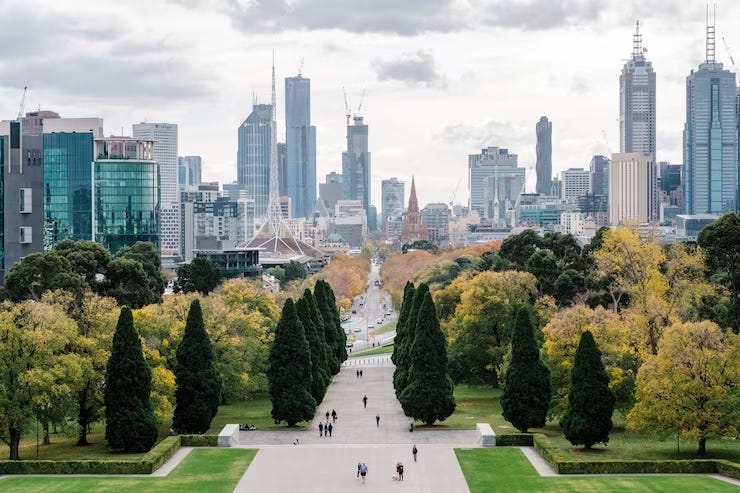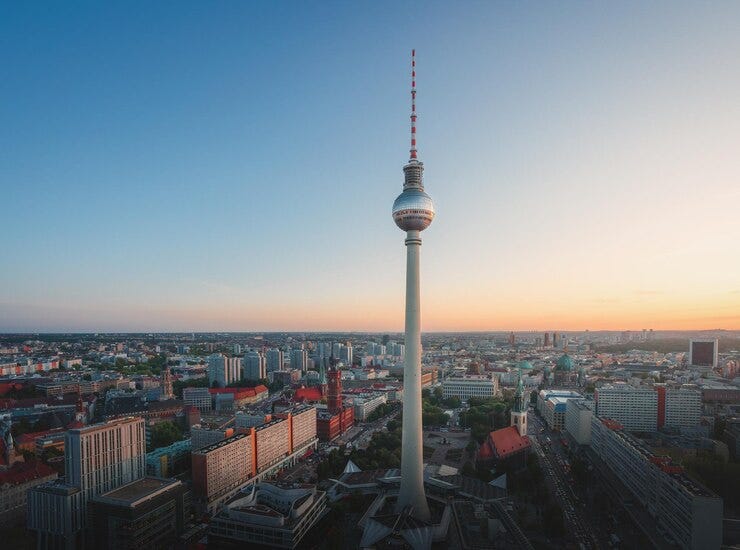
Globally, economies are navigating through evolving challenges with strategic adaptations. In the United Arab Emirates, government initiatives are bolstering the investment climate, particularly in the tech and social media sectors. Meanwhile, in India, despite the cautious economic atmosphere, there’s a notable influx of international capital fueling the vibrant startup ecosystem. The United States grapples with a dichotomy of booming public markets and private sector inflationary pressures, whereas Switzerland and Luxembourg exhibit financial resilience, with the former experiencing a private market resurgence and the latter thriving as a green technology investment hub. Germany’s economic outlook appears gloomy, yet there are indications of impending change, reflecting a broader global trend towards cautious optimism and a strategic pivot towards innovation and sustainable growth.
What is happening in the UAE?
Hatem Goucha, Founder at NewEra Consult LLC, shared that the United Arab Emirates, specifically Abu Dhabi and Dubai, is experiencing a positive shift in financing, driven by government action. He highlighted a recent government contribution of 44 million dirhams aimed at attracting investors in the social media sector. Goucha emphasized the impact of incubators like Hub 71 in Abu Dhabi, which offer substantial support to startups and play a crucial role in the economic development of the region. The government’s efforts extend beyond these cities, with Sharjah and Ras al-Khaimah also making significant strides in drawing investment, particularly for small and medium-sized enterprises, thereby enhancing the overall investment landscape in the UAE.
What is happening in India?
Ambuj Mathur, MP at Indite Ventures, provided insights into the current dynamics shaping India’s landscape. With the mega general elections on the horizon, a sense of anticipation pervades, influencing decisions across various domains. Despite the political uncertainty, India’s equity markets are experiencing unprecedented growth, fueled by substantial inflows into mutual funds and systematic investment plans. This influx of capital has led to inflated valuations for even the less-performing companies in the public markets, reflecting the optimistic sentiment pervading the financial sector. Ambuj pointed out the stark economic disparities within the country, with a small percentage of the population controlling a significant portion of the wealth. Nevertheless, the diverse and populous nation presents a plethora of growth and investment opportunities, particularly in the burgeoning early-stage company sector and for later-stage investment funds. India remains a vibrant hub of activity and potential, never ceasing to captivate with its dynamic and fast-paced economic environment. Additionally, Vinod Keni, Co-Founder at Peachtree Venture, expanded on the current economic landscape in India. He concurred with the ongoing cautious sentiment and slowdown, highlighting that while early-stage investing remains active, it has decelerated from previous levels. Keni noted the significant capital accumulation over the past years, leading to a considerable reserve of ‘dry powder’ among funds and investors, albeit with a more tempered pace of activity. Investment rounds from Series A through C are experiencing a slowdown as investors seek tangible progress and capital efficiency, prioritizing sustainable business models over mere growth in user base or market share. Guneet Banga, Co-Founder at Parinama, presented a more optimistic view of India’s current economic and political landscape. Despite caution regarding domestic business figures, he anticipates continued stable policies under a likely Modi government, enhancing predictability for investors. Prime Minister Modi’s prioritization of climate and environmental policies aligns with a global trend, with significant investments planned in climate technology. Mitesh Nandlaskar, Vice-President at Hem Securities Ltd, contributed to the discussion on India’s economic environment, highlighting the country’s growth and its appeal to foreign investors. Nandlaskar has observed active interest from foreign funds, particularly from the UK, which are keen to invest in Indian companies despite low activities in their local market.

What is happening in Australia?
Craig Astill, CEO of the Caason Group, shared insights into the recent developments in Australia, particularly in Melbourne. The city recently hosted the Australian Formula One Grand Prix, attracting a large number of visitors both from within the country and internationally. Despite the festive atmosphere, Craig notes that Australia, like many parts of the world, is still grappling with economic challenges. He points out the country’s low unemployment rate, which is below 4% and the significant migrant activity boosting various regions. However, in Melbourne, the property market is experiencing stagnation, with no growth in property values, attributed to new taxes and the financial strain of debts incurred during recent world events. This situation marks a shift from Melbourne’s previous acclaim as one of the world’s most liveable cities to facing economic difficulties.
To explore these changing global economic landscapes and connect with top industry experts and investors, ensure your participation in our upcoming events. Register now to join the next Global Investment Leaders Summit.
What is happening in the US?
Lincoln Ellis, Former Chief Investment Strategist for Northern Trust’s Global Family Office practice, provided his perspective on the current state of U.S. affairs and its global impact. Lincoln highlighted the noticeable absence of American leadership in foreign affairs, which he observes as having significant ripple effects on global financial markets and industrial and trade policies. He pointed out that the forthcoming national elections in the U.S. are contributing to a pervasive sense of uncertainty, affecting not only domestic policies but also international relations and economic stability. This uncertainty, according to him, is expected to continue affecting global dynamics at least through the first quarter of the next year. Additionally, Anthony Jarrin, CEO of The Cannaregio Group, provided an analysis of the current economic situation in the U.S. He described it as a conundrum, with public reports indicating a strong economy, yet private market experiences suggest complexities and challenges. Despite low unemployment and high revenue figures, the private sector is grappling with inflation and operational issues affecting profitability. The U.S. equity market is buoyant, supported by substantial investments both domestically and internationally, reflecting the country’s perceived economic stability. However, the private market feels the pressure of inflation and margin compression. Jarrin expressed optimism, noting the growth in top-line revenue and the potential for managing inflation and global crises effectively.

What is happening in Germany?
Martin Fritsch, Group Chief Financial Officer at VFS Global, commenting on the current state of affairs in Germany, described the national mood as gloomy, with widespread sentiment of crisis and difficulty. Despite the challenging circumstances, he hinted at the possibility of impending changes that might alleviate the situation. The funding landscape, particularly for early-stage ventures, is notably tough, with many struggling to secure necessary capital. He contrasted this with the later stages of business, where private equity markets in Germany are robust, characterized by strong demand, ample funding and numerous transactions.
What is happening in the Middle East?
Mohammad Salem, Founder at Salem Group, shared an optimistic outlook for the Gulf region despite recent challenges. He acknowledged the turbulence experienced in the western part of the MENA (Middle East and North Africa) region but noted signs of improvement, especially as the year progresses into the second and third quarters of 2024. Although the first quarter experienced some downturns, the overall sentiment for the MENA region is hopeful, with Salem highlighting the potential for growth and stability. His insights suggest a gradual recovery and a positive trajectory for the region’s economic and social landscape.
What is happening in Israel?
Robert Pincas, Co-Founder at Israel Acquisitions Corp, speaking on the current state of Israel, particularly in the technology sector, reported a notable downturn in tech investments over the last six months, affecting both early and later stages. However, he noted a significant resurgence in March, with investments amounting to $3.1 billion, primarily in the cybersecurity and Software as a Service (SaaS) sectors. This influx indicates a rebound and a promising future for the Israeli tech industry. Despite the complexities of the broader economic environment, the technology sector in Israel continues to advance, with numerous innovative developments emerging from the region.
What is happening in Switzerland?
Matthias Krug, Founder at Asset Empire, provided his perspective on the current situation in Switzerland and its comparison with the broader European market. He acknowledged the challenges faced by many European countries, including Germany, particularly in terms of regulations and asset registration, leading to a general market scarcity. While Switzerland is faring somewhat better, it still falls short of its standing a decade ago. He mentioned that many are turning to Luxembourg as a favorable destination, echoing sentiments of improved conditions there. Additionally, Emanuele Pizzatti, CIO at SIGF, shared insights into Switzerland’s recent economic developments, particularly in the private markets. After a period of skepticism, Emanuele observed a revival, with increased allocations from pension funds indicating renewed confidence. He highlighted the positive impact of the European Green Deal, noting significant activities and measures implemented in the early months of the year across different economic layers, including increased activity by the European Investment Fund (EIF). Switzerland’s proactive financial policy, notably the setting of interest rates at 1.5%, signals a favorable environment for private markets.
What is happening in Luxembourg?
David Moscato, Managing Partner at Quarantia Capital Advisory, shared insights from Luxembourg, noting its position as the leading fund center in Europe and second globally after the United States. He highlighted the burgeoning interest in green technology, driven by the priorities of the newly elected government. Venture capital, particularly in technology, is a key focus, with Luxembourg developing strong structures and systems to support investment activities, including bond structures and securitizations. Despite challenges in the residential market due to interest rate spikes, David expressed optimism for a potential decrease in rates by June, influenced by trends in major central banks. This anticipated shift is expected to rejuvenate real estate investment in Luxembourg, indicating a strategic pivot in the country’s investment landscape and economic outlook.
The 168th G.I.L.C. Summit convened leading investment experts worldwide to explore shifting economic landscapes in different countries. To remain at the forefront of global finance, secure your spot at future Club gatherings by registering here.





